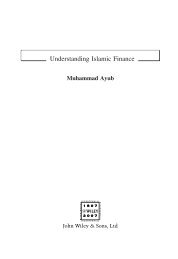Leadership and Management Development in Education (Education ...
Leadership and Management Development in Education (Education ...
Leadership and Management Development in Education (Education ...
You also want an ePaper? Increase the reach of your titles
YUMPU automatically turns print PDFs into web optimized ePapers that Google loves.
THE NATIONAL COLLEGE FOR SCHOOL LEADERSHIP85University master’s degrees, <strong>and</strong> other forms of leadership development, willnot be acceptable alternatives. This will re<strong>in</strong>force the perception, <strong>and</strong> thereality, that the NCSL is tak<strong>in</strong>g control of the school leadership agenda. ‘Thecollege’s power has been exercised wisely but the lack of pluralism <strong>in</strong>evitablycarries risks’ (Bush 2006: 509).A significant side-effect of the creation <strong>and</strong> success of the NCSL has been itsnegative impact on universities. Some have closed or scaled down theireducational leadership centres while all are experienc<strong>in</strong>g difficulties <strong>in</strong>recruit<strong>in</strong>g c<strong>and</strong>idates to their master’s <strong>and</strong> doctoral programs. Many schoolleaders who might have taken postgraduate degrees now seem to believe thatNCSL’s less dem<strong>and</strong><strong>in</strong>g provision is sufficient to meet their needs. Theacademic field of educational adm<strong>in</strong>istration <strong>and</strong> leadership rema<strong>in</strong>simportant for scholarship but its long-term future is uncerta<strong>in</strong>. Someuniversities are respond<strong>in</strong>g by focus<strong>in</strong>g on research, <strong>and</strong> <strong>in</strong>ternationalprogrammes, but these are unlikely to generate sufficient <strong>in</strong>come to enable allthe specialist centres to survive (Bush 2006: 510).Lev<strong>in</strong>e (2005: 58) notes that the NCSL does not award degrees <strong>and</strong> adds that‘the college seeks partnerships with universities so that their students can earndegrees <strong>and</strong> credits for their NCSL work’. In practice, however, only a t<strong>in</strong>yproportion of College participants do so. The College’s 2007 remit letter fromthe Secretary of State urges the College to consider how accreditation l<strong>in</strong>kswith other courses might be developed (www.ncsl.org.uk/programmes). Whilethe new model NPQH proposal makes tentative l<strong>in</strong>ks to ‘M’-level work, thisfalls short of the full articulation necessary to produce a mean<strong>in</strong>gful l<strong>in</strong>kbetween College provision <strong>and</strong> academic leadership programmes.It is unduly <strong>in</strong>fluenced by the governmentWhen the NCSL was established, it was expected to fulfil three ma<strong>in</strong> roles:• To be a government agency, respond<strong>in</strong>g to the requirements set out by theSecretary of State <strong>and</strong> elaborated by Departmental officials• To be a voice for school leaders, articulat<strong>in</strong>g their views to government• To be an <strong>in</strong>dependent organisation, develop<strong>in</strong>g <strong>and</strong> implement<strong>in</strong>g its ownpolicies <strong>and</strong> programmes.While Southworth (2004: 340) states that the College seeks active partnershipswith all the key players <strong>and</strong> stakeholders <strong>in</strong> the education service, there can belittle doubt that NCSL’s pr<strong>in</strong>cipal stakeholder is the government, for three ma<strong>in</strong>reasons:
















